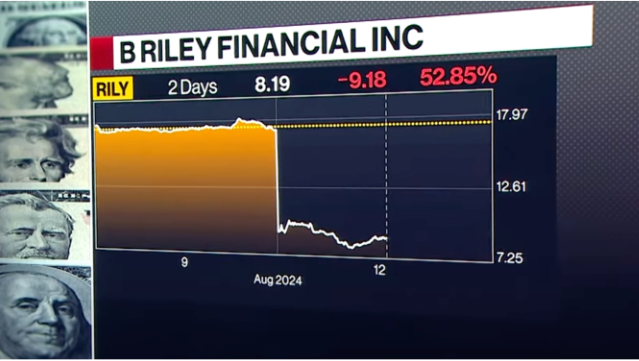News
B Riley Financial Halts Dividend Amid Troubling Financial Signals

B Riley Financial shocked its investors on August 10th by announcing the suspension of its quarterly dividend, causing its stock to plunge by 23%. This unexpected move has raised serious questions about the company’s financial stability, prompting investors to reassess their positions.
B Riley Financial’s Shocking Announcement
The decision to halt the dividend came as a surprise to many. B Riley Financial has long been known for its robust dividend policy, which was a key attraction for income-focused investors. The abrupt suspension, coupled with the steep decline in stock price, paints a concerning picture of the company’s financial health.
The suspension was attributed to the need to preserve capital, according to the company’s statement. However, the underlying reasons appear to be more complex. Some analysts suggest that B Riley’s move reflects deeper financial troubles, potentially signaling a liquidity crunch or deteriorating earnings that could impact the company’s long-term viability.
Financial Struggles Revealed
This dividend suspension comes on the heels of a series of monetary challenges faced by B Riley Financial. The company has been grappling with declining revenues, rising expenses, and increasing debt levels. The combination of these factors has strained its cash flow, making it difficult to maintain its previous dividend payments.
Moreover, the broader economic environment has not been favorable. With interest rates on the rise and economic uncertainty looming, companies like B Riley Financial, which rely heavily on financial services and investments, have faced significant headwinds. The market has been unforgiving, and B Riley’s decision to suspend its dividend underscores the difficulties it faces in navigating these turbulent times.
Investor Sentiment Sours
Investor reaction to the dividend suspension has been overwhelmingly negative. The 23% drop in stock price reflects a loss of confidence in the company’s ability to manage its finances effectively. Many investors, who had relied on B Riley for steady income through dividends, are now left reconsidering their investment.
The suspension also raises concerns about the future of B Riley Financial. Without the regular dividend payments, the company loses a critical element of its appeal to income investors. This could lead to further declines in stock price as investors exit their positions, seeking safer and more stable investment options.
Is There a Bigger Picture Behind B Riley FInancial’s Problems?
B Riley Financial’s situation is indicative of a broader trend in the financial sector. Companies that have over-leveraged themselves in recent years are now facing the consequences as economic conditions tighten. The suspension of dividends, once considered a last resort, is becoming more common as companies prioritize liquidity and financial stability over shareholder returns.
For investors, the lesson is clear: in times of economic uncertainty, it is essential to reassess the financial health of companies in your portfolio. High dividend yields may seem attractive, but they can also be a sign of underlying financial distress.
What Lies Ahead for B Riley Financial?
As B Riley Financial attempts to stabilize its finances, the road ahead looks challenging. The company will need to address its debt levels and improve its cash flow to regain investor confidence. Additionally, management will need to communicate a clear strategy for navigating the current economic landscape and restoring shareholder value.
For now, investors will likely remain cautious. The suspension of the dividend is a significant red flag, and until B Riley can demonstrate a strong and sustainable financial recovery, its stock may continue to face downward pressure.
Can B Riley Financial still recover from this disaster? What should the company do to turn the situation around?



